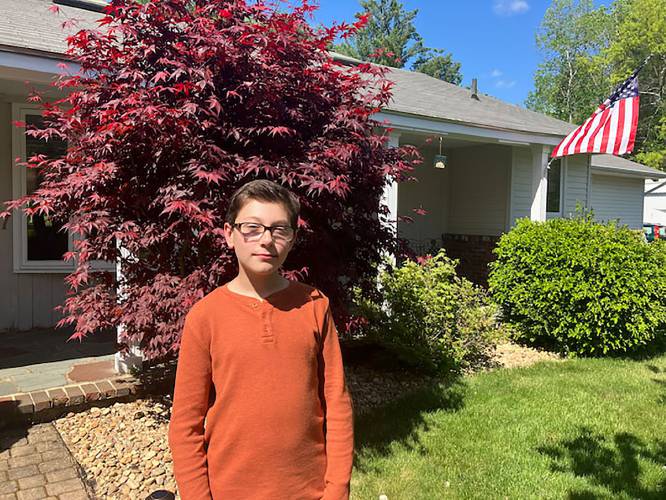Efforts renewed to include eating disorder helpline on student IDs

Matthew Brown, a Merrimack High School freshman who proposed a bill to add national eating disorder resources to middle school and high school student ID cards. (New Hampshire Bulletin - Ethan DeWitt)
| Published: 04-04-2024 10:29 AM |
A year after its initial veto, a bill advocating for the inclusion of an eating disorder helpline on student identification cards made a comeback, this time proposing a different helpline number linked to the National Alliance for Eating Disorders.
Building upon the Jason Dickey Suicide Prevention Act, which places the Suicide Prevention Lifeline phone number on student identification cards, House Bill 1109 seeks to extend support by adding a helpline for eating disorders on student ID cards for grades 6 to 12 across all public and charter schools in the state.
The bill would also update the 10-digit national suicide prevention lifeline number to 988 to reflect the changes made in July 2022.
The push to include the eating disorder helpline on student IDs started two years ago when Matthew Brown, who struggled with an eating disorder, felt uncomfortable due to overeating and sought help through an online search, leading him to the national helpline for eating disorders.
Now a sophomore at Merrimack High School, Brown has transformed his personal experience into advocacy, collaborating with state legislators to ensure that resources for eating disorders are featured on student ID cards.
“If I was given only the option to reach out to the 988 helpline, I wouldn’t have taken it because at that time I was not having suicidal ideations or thought that I was in a crisis,” Brown said at a public hearing for the bill in January. “I just did it on a whim like so many children and teens do.”
Eating disorders include behaviors like overeating, severe fasting, body dysmorphia and other compensatory actions that impact individuals regardless of age, gender, or sexual orientation.
According to the National Alliance for Eating Disorders, more than 29 million Americans encounter a clinically significant eating disorder at some point in their lives. Eating disorders have the second-highest mortality rate among mental illnesses.
Article continues after...
Yesterday's Most Read Articles
 ‘It’s hard not worrying about it’ – Local Market Basket employees, shoppers react to suspension of CEO Arthur T. Demoulas
‘It’s hard not worrying about it’ – Local Market Basket employees, shoppers react to suspension of CEO Arthur T. Demoulas
 What’s the best way to get to New York City? We tested one of the new options for Concord-area residents.
What’s the best way to get to New York City? We tested one of the new options for Concord-area residents.
 More NH Rite Aid stores slated to close following bankruptcy — but none in Concord
More NH Rite Aid stores slated to close following bankruptcy — but none in Concord
 Bell-to-bell ban on cell phones in schools passes State House with flying colors
Bell-to-bell ban on cell phones in schools passes State House with flying colors
 Opinion: Concord should be run like a household, not a business
Opinion: Concord should be run like a household, not a business
Last year, an attempt to include the National Eating Disorder Helpline on student ID cards failed when the organization announced that it would end the human-staffed helpline and switch to a computer-operated chatbot named Tessa.
The chatbot was also temporarily disabled due to issues with the information it was sharing, prompting Gov. Chris Sununu to veto the bill after multiple advocacy groups and bill sponsors flagged the problems with the helpline.
While the 988 helpline can provide support for individuals struggling with eating disorders, Susan Stearns, the executive director of the National Alliance for Mental Health New Hampshire, who lost her sister to the disease, explained that treatment of eating disorders demands specialized expertise.
“If we’re hearing from students that they are more likely to call if it says eating disorder hotline, I think we need to listen to our young people because eating disorders can prove to be deadly,” Stearns said in an interview. “We want to make sure kids can get help and this seems to be one of the better ways for kids to recognize there is a place for them to get help if they’re struggling with disordered eating.”
While many associate social media as a cause of mental illness and eating disorders, Stearns said a limited amount of healthy online activity can be a crucial support system for some, such as LGBTQ+ adolescents, who feel isolated.
Her message to parents is to look at their kid’s social media, not to keep them away, but to engage them in conversations and ask questions.
“Sometimes kids can come away with negative messages from social media that make them feel badly about themselves and I just think it’s important for parents to make sure they’re engaging in those conversations with the young people,” said Stearns.
National Suicide Prevention Lifeline: Call or text 988 or chat at 988lifeline.org
National Alliance for Eating Disorders: Call the helpline at +1 (866) 662-1235
The Trevor Project: A national 24-hour, toll-free confidential suicide hotline for LGBTQ youth. If you are a young person in crisis, feeling suicidal or in need of a safe and judgment-free place to talk, call 1-866-488-7386.







 ‘It was painful’: Senate passes state budget
‘It was painful’: Senate passes state budget Finalizing the budget: What to look for in the State House this week
Finalizing the budget: What to look for in the State House this week Bow offers water to Hooksett plant, asks Concord to help fix its supply
Bow offers water to Hooksett plant, asks Concord to help fix its supply Hyper-local, good-news-only paper in Andover is closing
Hyper-local, good-news-only paper in Andover is closing
